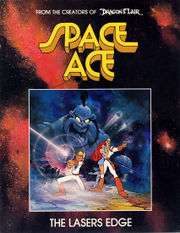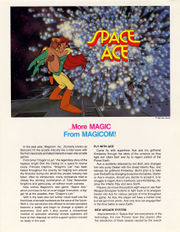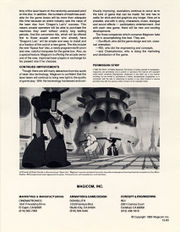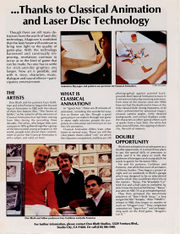Lost In Translation/Space Ace
| Space Ace | |
|---|---|
| Manufacturer | Cinematronics |
| Released | 1983 |
| Control Method |
8-way Joystick 1 Button(s) |
| Main CPU | Laserdisc Z80 (@ 4.000 MHz) |
| Sound CPU | Stereo AY-3-8910A (@ 2.000 MHz) Custom |
| Video Details |
Raster (Horizontal) 256 x 256 pixels 59.94 Hz Palette colours |
| Screens | 1 |
| ROM Info | 5 ROMs plus Laserdisc, Hard Disk or CD-ROM 40,960 bytes (40.00 KiB) |
| MAME ID | spaceace · spaceaa2 · spaceaa · saeuro |
About The Game
Space Ace is a Laserdisc-based arcade video game.
One gallant earthling stands between the inter-planetary invasion forces of the blue-skinned alien Commander Borf and their intended target, Earth : an earthling named Dexter. On Dexter's narrow shoulders ride the fate of Earth and the well-being of his lovely sidekick, Kimberly, who Borf has carried off into the cosmos.
Dexter sets off in hot pursuit of Lord Borf, battling monsters, machines and mechanisms as he fights his way across the galaxy. During his daring quest, Dexter relies on his wits, agility and quick reflexes to overcome the deadly predicaments and bizarre opponents Borf throws in his path; but when the peril grows too great for even cunning and courage to prevail, Dexter has a secret strength in reserve.
Exposure to mysterious cosmic rays has given Dexter a remarkable ability. Just when our hero seems doomed and all appears lost, he undergoes a startling transformation into his super-mighty, super-bold, super-self : SPACE ACE! - a broad-shouldered, good-natured alter ego who evens out the odds as Dexter struggles to rescue Kimberly.
Pursued to his home planet by this resourceful and relentless adversary, Borf turns and faces Dexter in a final and climactic confrontation. Determined to prevail at all costs, Borf resorts to the ultimate weapon, a weapon capable of reducing even the mighty Space Ace into a helpless infant : the dreaded INFANTO-RAY! Only Space Ace can survive such a crisis, and Space Ace alone can save the Earth, save the girl, and save the day!
Additional Technical Information
ACTION BUTTON : The action button functions in a variety of ways in a variety of situations. Most frequently the Action button fires weapons and energizes Dexter into Space Ace.
JOYSTICK : The joystick controls the direction of movement of the Dexter and Space Ace characters.
Trivia
The animation staff provided their own voices for their own characters, in order to keep the costs down. Animator, Jeff Etter was the voice of Ace. Storyman / animator Will Finn was the voice of Dexter. Animator, Lorna Pomeroy (wife of Co-Producer, John Pomeroy) was the voice of Kimmy. Don Bluth was the voice of Commander Borf. The narrator was Michael Rye and the musical score was created by Christopher Stone.
The scantily-clad heroine Kimberly was named after one of the people of the animation staff whose name was Kimberly Coy.
Space Ace was released in 1984 by Cinematronics/magicom and licensed to Atari and Sidam (only Italy) for the European market. The European version of Space Ace doesn't have the skill select that the Cinematronics version has. The Atari's and Sidam's version were made for the PAL system and the Cinematronics version was made for the NTSC system.
The Cinematronics hardware and software were also totally different from Atari's/Sidam's.
Space Ace was re-released in 1991, this time without the different skill levels, was released as a conversion kit for "Dragon's Lair II - Time Warp". But this time it was Leland that produced the game.
Cinematronics went out of business late in 1984, the same year Space Ace was first released. None of the hardware or software from Cinematronics 1984 version were used in Lelands 1993 version.
Space Ace was again licensed to Atari and Sidam (only Italy) for the European market. But this time Leland, Atari and Sidam used some of the same hardware for the 1991 version of Space Ace. Leland used a Sony 1450 LD-player. Atari and Sidam again used a Philips player, allowing them to skip the NTSC pcb.
A Space Ace machine was shown at the 2003 classic arcade games show 'California Extreme', San Jose, California.
Space Ace was also featured as an animated series : Ruby-Spears Productions. Produced By Joe Ruby, Ken Spears. Aired as part the second season of 'Saturday Supercade' on CBS.
Updates
Some scenes are left out in Cinematronics version, depending on the skill level the player plays. In skill level 'Space Ace' all scenes are included.
In 1991, Leland released a slightly updated version of Space Ace in the form of a conversion kit for the then recently-released "Dragon's Lair II - Time Warp". The updated version added more complicated moves (including diagonal moves), and dropped the easier skill levels, meaning only the 'Ace' (difficult) level could be played.
Cabinet and Artwork
Ports
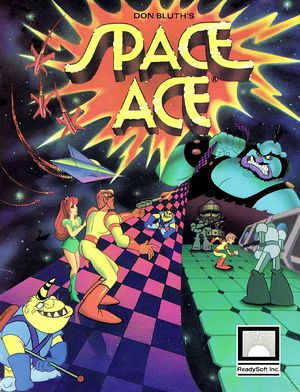
- Consoles
- Philips CD-I (1993)
- Nintendo Super Famicom (1994)
- Sega Mega-CD (1994)
- Panasonic 3DO (1995)
- Atari Jaguar CD (1996)
- Computers
- Commodore Amiga ("Space Ace", 1990, ReadySoft)
- Commodore Amiga (1991, "Space Ace II: Borf's Revenge", ReadySoft)
- Commodore Amiga (1993, "The Animation Classics Pack")
- PC [MS-DOS, CD-ROM] (1994)
- PC [MS Windows 9x, CD-ROM] (2003)



